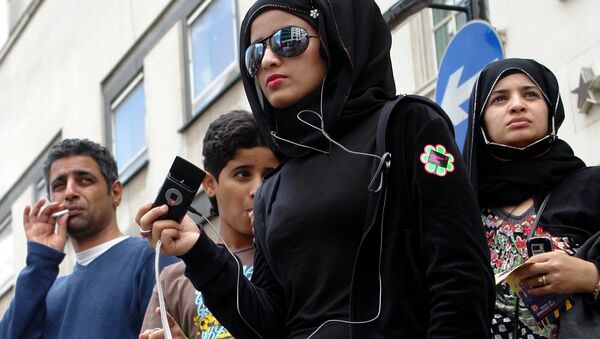The controversial preacher — who had a public speaking ban lifted in December following his arrest for terror offences — is to front the media today, suggesting that voting is a 'sin' under Islamic law, as Islam follows laws made by God, and not by parliaments.
Images from Islamic Roadshow yesterday inviting people to Islam, enjoining good & forbidding evil #StayMuslimDontVote pic.twitter.com/VGf4GsBuBn
— Anjem Choudary (@anjemchoudary) March 8, 2015
Despite Choudary's claims being considered extremist by many and not representative of the broader Muslim community, there is evidence to suggest that large parts of the UK's Muslim population may not head to the polls in May's election, with many feeling unrepresented, or even targeted by the country's political establishment.
'Target Extremism, Not Muslims'
The rise of the Islamic State in 2014 and the worrying numbers of Brits who have left the country to fight alongside jihadists in the Middle East has prompted the UK government to take a tough stance against homegrown extremism.
The government recently outlined new proposals aimed at countering extremism, and while Home Secretary Theresa May said the UK needed to tackle all different forms of radicalization, she added:
"The most serious and widespread form of extremism we need to confront is Islamist extremism."
Some Muslim leaders, who saw it as an attack on the Islamic community, criticized the comments, along with additional proposals to ban some religious preachers and close certain Islamic institutions.
Sickening — vandals target Muslim graveyard in Glasgow: http://t.co/2sT8LG3AcG
— MCB (@MuslimCouncil) March 26, 2015
The Muslim Council of Britain (MCB) released a statement saying: "We have consistently argued that the best counter-terrorism strategy involves upholding our own values of freedom, civil liberties and ensuring that we do not single out any specific community."
The MCB was heavily critical of the government's proposed anti-extremist measures, saying the plans wouldn't target the root causes of radicalization in Britain, but would merely marginalize the Muslim community as a scapegoat for extremist violence.
@UK_CAGE @bbcquestiontime @y_alibhai So what was the driving force to radicalisation then? Radical muslims or failed policy?
— David Bloor (@DavidBloor2) April 2, 2015
"The Home Secretary proposes a series of measures that are designed more to address the anxieties people have against Muslims and their religious life, rather than the scourge of terrorism itself," a spokesperson said.
"The evidence shows that extremism and radicalization takes place outside of mosques, and often online, as we have outlined in our work on radicalization. Proposals of mosque closure orders therefore, are misguided at best, divisive at worst."
Radicalization and the 'Others'
Although the government has blamed what it believes to be corrupt individuals and institutions for the rise in extremism, many have argued that it is in fact a disengagement and sense of isolation within wider society that has allowed young Muslims in the UK and in Europe to be drawn towards radical preachers.
Warsi: 'Islamophobia major driver of radicalisation, but no government minister willing to recognise this.' #MuslimLeadershipUK
— Stephen Jones (@StphnHwrdJns) April 1, 2015
When writing about British Muslims and causes of radicalization, academic Orla Lynch addressed the creation of the "others" in society, noting that radicalization had become associated with the Muslim community, who were being increasingly stereotyped and segregated as "others" within Britain.
.@Nigel_Farage say Muslims are 5th column. Majority see themselves British #Farage5thColumn http://t.co/IGFFhpZvNk pic.twitter.com/CTZLzpCFlA
— MCB (@MuslimCouncil) March 12, 2015
She writes that the potential radicalization of British Muslim youth is linked to "alienation due to living in separate or parallel communities, identity crisis and intergenerational conflict," suggesting that a feeling of being disconnected from wider society could be a factor facilitating extremism.
"Because of this, terrorism, radicalism and extremism have become entangled with notions of identity, integration, segregation and multiculturalism, and this entanglement has made being a 'Muslim youth' a precarious designation in the United Kingdom," she added.
British Muslims under siege? Regents Park Mosque + EDL Demo — pic.twitter.com/HZzwAJ1Sg2 (by @drusamahasan)
— Orla Lynch (@OrlaLynch_ol) April 18, 2014
This line of thought suggests that many young disenchanted Muslims may in fact find the views of some controversial preachers, such as Anjem Choudary, attractive and may be drawn to the sense of community that they bring.
'I Don't Know Who to Vote For'
Despite many condemning the rhetoric of controversial preacher Anjem Choudary, some young British Muslims will inadvertently do as he suggests and not vote in this year's general election, albeit for far different reasons.
Among them is 24-year-old London-born Muslim, Hamzar Mohammad, who says he's unsure if he will head to the polls on May 7, because he doesn't think there is a voice in British politics that would stand up for British Muslim issues.
"I really don't know who to vote for," he said.
"I want to vote and I'm trying hard to follow politics and make a sensible decision. But when I hear the constant stream of aggressive, anti-immigration, anti-Islamic sentiment, as subtle or blatant as it may be, it just completely turns me off. I feel as though there's no leader or party that would stand up for my rights, not only as a young Brit, but as a young British Muslim."
As Britain's political leaders continue on another day of campaigning in the hope of securing some last-minute swing voters, evidence has shown that many of the country's young Muslims feel increasingly isolated, and perhaps even targeted by the rhetoric of some sections of mainstream British politics.
Subsequently, there is a fear that this sense of isolation and inaction to engage young British Muslims could drive some into the hands of radical preachers.



